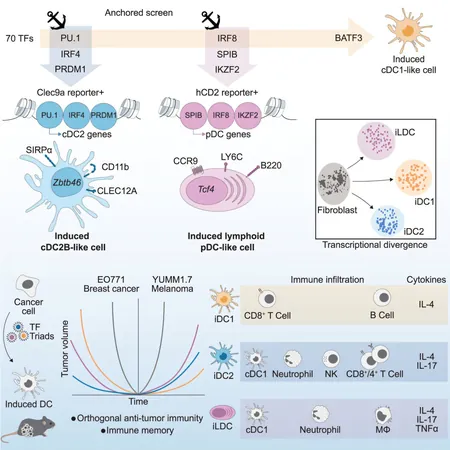
Revolutionizing Cancer Treatment: Breakthrough in Immune Cell Reprogramming
2025-08-29
Author: Arjun
A Game-Changing Discovery in Cancer Therapy
In a groundbreaking study, an international team of researchers led by Lund University in Sweden has uncovered the essential molecular tools needed to transform ordinary cells into specialized immune powerhouses. This remarkable finding, published in the journal Immunity, could revolutionize cancer treatment with more tailored and effective immunotherapies.
Harnessing the Immune System's Potential
The researchers have unlocked a vital step toward utilizing the immune system's natural defenses against cancerous cells. Their innovative work reveals a genetic toolkit designed to program two potent subtypes of dendritic cells—crucial players that instruct the immune system to recognize and combat threats, including tumors.
Dendritic cells act as the body's "teachers," each subtype orchestrating unique immune responses tailored to specific dangers. By supplying patients with custom-engineered dendritic cells aimed at targeting their cancer, treatments could become not only more precise but also immensely more powerful.
Decoding the Mystery of Dendritic Cell Diversity
For years, scientists have grappled with understanding how cellular diversity among dendritic cells is generated. While some transcription factors (proteins responsible for activating or deactivating genes) have been identified in this developmental process, the intricate interactions among these factors remained elusive.
The Lund University team took a comprehensive approach by systematically mapping the pathways leading to dendritic cell identity. Testing 70 different transcription factors, they successfully discovered two distinct toolkits that could reprogram ordinary skin or cancer cells into powerful dendritic cell subtypes.
Promising Results in Cancer Models
In promising laboratory experiments using mouse cancer models, engineered dendritic cell subtypes generated robust immune responses against melanoma and breast cancer, mirroring the behaviors of their natural counterparts. Although still in its infancy, this research indicates that providing patients with specialized dendritic cells could significantly enhance the efficacy of immunotherapy.
Towards Personalized Immunotherapy
Professor Filipe Pereira, the lead researcher, emphasized the potential of this breakthrough: "Immunotherapy is one of the most exciting frontiers in medicine, yet not all patients benefit. Our findings demonstrate that by generating specific dendritic cell types, we can fine-tune the immune response to combat various cancers more effectively. This marks the beginning of truly personalized immunotherapy."
Beyond Cancer: New Horizons in Autoimmune Disease Treatment
The implications of this discovery extend beyond oncology, potentially impacting the treatment of autoimmune disorders. Some dendritic cells naturally have the ability to suppress immune responses. By reprogramming these cells into anti-inflammatory subtypes, researchers could develop targeted interventions for diseases where the immune system mistakenly attacks the body.
A Blueprint for the Future
This study offers a pioneering blueprint for dendritic cell reprogramming within the immune system, serving as a critical resource for developing enhanced treatments for both cancer and immune-related disorders. With these insights, the future of personalized medicine looks brighter than ever.
 Brasil (PT)
Brasil (PT)
 Canada (EN)
Canada (EN)
 Chile (ES)
Chile (ES)
 Česko (CS)
Česko (CS)
 대한민국 (KO)
대한민국 (KO)
 España (ES)
España (ES)
 France (FR)
France (FR)
 Hong Kong (EN)
Hong Kong (EN)
 Italia (IT)
Italia (IT)
 日本 (JA)
日本 (JA)
 Magyarország (HU)
Magyarország (HU)
 Norge (NO)
Norge (NO)
 Polska (PL)
Polska (PL)
 Schweiz (DE)
Schweiz (DE)
 Singapore (EN)
Singapore (EN)
 Sverige (SV)
Sverige (SV)
 Suomi (FI)
Suomi (FI)
 Türkiye (TR)
Türkiye (TR)
 الإمارات العربية المتحدة (AR)
الإمارات العربية المتحدة (AR)